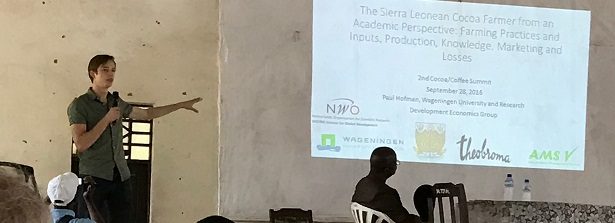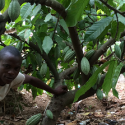Research presentation at the National Cocoa and Coffee Conference in Sierra Leone

For the Global Challenges Programme (GCP) project “Helping poor farmers grow money in Sierra Leone”, consortium members presented at the Sierra Leonean National Cocoa and Coffee Conference on September 28, 2016. The conference was organized by the national Cocoa and Coffee Working Group which brings together stakeholders from the private sector, government and NGOs. The goal of the presentation was to provide an overview of the cocoa sector at the smallholder level of the farmers and villages involved in the GCP project.
As part of the project activities, the consortium has collected extensive data on cocoa production and marketing. Currently, there is very little known about small-scale cocoa farming in Sierra Leone. The data shows that most farms are small at less than two hectares, and yields levels are low: less than 100 kg per hectare (yields in Ghana are almost 250 kg/ha). One cause of low productivity are high crop losses due to Black Pod, a cocoa fungal disease. Data analysis suggests that this can in part be alleviated by organizing production in larger, younger farms. Several audience members agreed with this last finding. The Sierra Leonean cocoa sector can be improved by promoting farmers to focus more on cocoa farming, rather than doing it on the side.
Conclusions on small-scale cocoa farming in Sierra Leone |
|
Conference exchanges on improving cocoa production
Other speakers at the conference highlighted the need to move beyond smallholders to increase the total volume of cocoa produced. One speaker pointed out that the government can play an important role in increasing the total volume produced. Private sector representatives fear that the government could take control of the cocoa market and establish a marketing board. This could drive a wedge between farm and export prices, decreasing profits for both farmers and exporters.
By communicating knowledge on the scale of the cocoa sector and opportunities to alleviate constraints to policymakers and NGOs the project group hopes to contribute to long-term improvements of the Sierra Leonean cocoa sector, and ultimately the lives of small-scale cocoa farmers. Since there is very little evidence the project consortium can make a strong contribution here.






